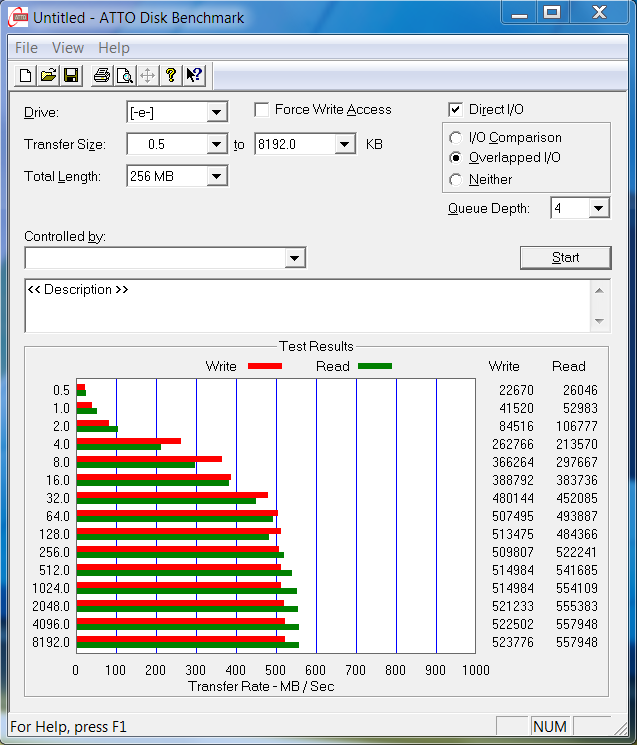ATTO Disk Benchmark is perhaps one of the oldest benchmarks going and is definitely the main staple for manufacturer performance specifications. ATTO uses RAW or compressible data and, for our benchmarks, we use a set length of 256mb and test both the read and write performance of various transfer sizes ranging from 0.5 to 8192kb. Manufacturers prefer this method of testing as it deals with raw (compressible) data rather than random (includes incompressible data) which, although more realistic, results in lower performance results.
 With ATTO Disk Benchmark results of 557MB/s read and 523MB/s write, initial tests are right in line with listed specifications which is a great way to start.
With ATTO Disk Benchmark results of 557MB/s read and 523MB/s write, initial tests are right in line with listed specifications which is a great way to start.
CRYSTAL DISK BENCHMARK VER. 3.0 X64
Crystal Disk Benchmark is used to measure read and write performance through sampling of raw (0/1 Fill/compressible) or random data which is, for the most part, incompressible. Many new SandForce Driven SSD owners who cant wait to test the performance of their SSD often grab this program and run a quick test, not realizing that they are testing with incompressible data rather than compressible data used in testing by manufacturers. We have provided compressible (oFill) results on the left with incompressible (random data) results on the right.

 As shown by the result on the right when testing with incompressible data, the high sequential and 512k write access performance drops a bit but are still nice numbers in comparison to what we have previously seen in many SSDs.
As shown by the result on the right when testing with incompressible data, the high sequential and 512k write access performance drops a bit but are still nice numbers in comparison to what we have previously seen in many SSDs.
AS SSD BENCHMARK VER 1.64
Up until recently, AS SSD was the only benchmark created specifically for SSD testing and it uses incompressible data. AS SSD, for the most part, gives us the worst case scenario in SSD transfer speeds while using SandForce Driven SSDs as they use compression in storage as discussed earlier. Many enthusiasts like to benchmark with AS SSD for their needs.
 AS SSD confirms the result for Crystal DiskMark , when testing with incompressible data samples, as well as showing us some very speedy disk access times. Lets take a quick look at the AS SSD Copy Bench results.
AS SSD confirms the result for Crystal DiskMark , when testing with incompressible data samples, as well as showing us some very speedy disk access times. Lets take a quick look at the AS SSD Copy Bench results.
 The SSD Review The Worlds Dedicated SSD Education and Review Resource |
The SSD Review The Worlds Dedicated SSD Education and Review Resource | 
Nice, was wondering when Intel will show their Sandforce SSDs. The prices on the others drop drastically and some have already reach $1/GB after rebate.
If Intel is using the Sandforce 2281 then I dont understand why OCZ bought Indilinx. Obviously Intel had a choice. They are as big as you can get and if they chose Sandforce over the controllers that are in the Samsung SSDs they must be extremely reliable. JMHO.
Can’t wait to see how these babies do in Raid0!
This is an excellent article! Great work Les 🙂 no pressure for me on the followup lol 😉
Fabulous article – I like the detail especially about the 16GBs being used by the firmware.
I’ve read that the 520s do not have capacitors, so if there is a power shut down (happened to me two nights ago) that the information on the hard drive is gone. Is this true?
Can you link your quote? Intel 520’s do, in fact, have data loss protection in the event of power loss. It is part of Intels ‘End To End Data Protection’
https://www.intel.com/content/www/us/en/solid-state-drives/solid-state-drives-520-series.html
would be interested to see a review of the sandisk extreme ssd. it’s by far the cheapest sandforce powered ssd with toggle nand – buy.com has the 120gb for about $160 and 240gb for about $320. that’s a steal. storagereview reviewed it and were very impressed.